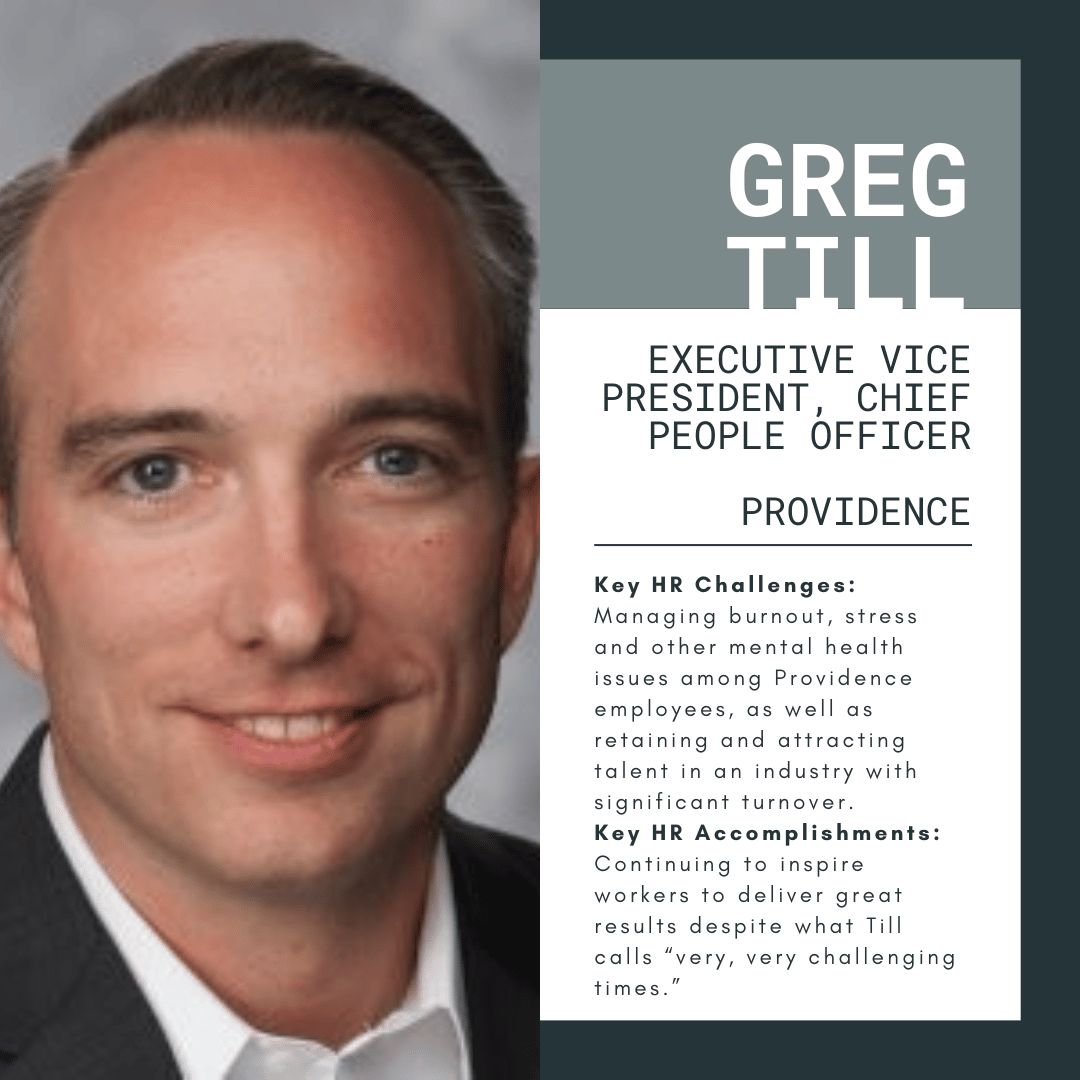Navigating the past two-plus years of complete chaos—from the continuing COVID-19 pandemic, health concerns and burnout to staffing challenges and high employee turnover—has undoubtedly been a challenge for the majority of HR and business leaders. But perhaps no industry has experienced as many of these challenges as the healthcare sector.
Healthcare workers are continuing to treat scores of COVID patients, while also dealing with new threats like monkeypox and polio. They’re worried about getting sick on the job. Even violence in hospitals and healthcare settings has hit new levels. As a result, burnout, anguish and mental health issues are sky-high among healthcare workers. And turnover is hitting record rates, with many healthcare workers—frustrated and fed-up—leaving the industry altogether. (Roughly 20% of healthcare workers have left the industry since the pandemic began, according to estimates from the Bureau of Labor Statistics.)
Suffice to say, all this gives Greg Till—executive vice president, chief people officer at health system Providence, headquartered in Renton. Wash., who manages the company’s 120,000 employees—every reason to be stressed.
“It’s layers upon layers. We like to say we’ve seen some of these things before, but never on top of each other like they have been,” says Till, one of this year’s HRE Honor Roll inductees.
 In many ways, stress has only worsened for healthcare workers, including those at Providence, in the past year. In the beginning of the pandemic, healthcare workers were sustained by overwhelming public support and a sense of duty. “All the healthcare workers that were fearful and uncertain, they actually said, ‘You know what? We’re going to dig deep, and we’re going to stick around and protect our communities because that’s what we were called to do,’ ” Till explains, adding that Providence saw the lowest level of attrition on record during the first year of COVID (15.5% in 2020 vs. a 21.6% baseline). (On Jan. 20, 2020, the first known COVID patient in the U.S. was identified at Providence’s Regional Medical Center in Everett, Wash.)
In many ways, stress has only worsened for healthcare workers, including those at Providence, in the past year. In the beginning of the pandemic, healthcare workers were sustained by overwhelming public support and a sense of duty. “All the healthcare workers that were fearful and uncertain, they actually said, ‘You know what? We’re going to dig deep, and we’re going to stick around and protect our communities because that’s what we were called to do,’ ” Till explains, adding that Providence saw the lowest level of attrition on record during the first year of COVID (15.5% in 2020 vs. a 21.6% baseline). (On Jan. 20, 2020, the first known COVID patient in the U.S. was identified at Providence’s Regional Medical Center in Everett, Wash.)
But over the many months of continuing cases and the ebbs and flows of different COVID waves, there has been a slowdown in terms of community support, he says. “Frankly, it became a grind for the healthcare workers, and they became burnt out. The Great Resignation hit healthcare the hardest.”
Doing things ‘differently’ in healthcare
These are all challenges Till is working to manage, even as new ones emerge both externally and inside the sprawling health system. Along with other HR leaders at Providence, Till has not only worked to make things better for his employees, but he is striving to make the healthcare industry and its workforce more sustainable in the years ahead.
His biggest priority of late for employees is taking aim at mental health. He has tripled the company’s investment in mental health and wellbeing initiatives. In total, Providence invested $300 million in mental health and other benefits investments—including pay protection programs, emergency time off, and free child/family care.
Mental health resources, unlimited access to virtual mental health counseling, mental health apps and access to suicide lines are all part of the equation. So is training for managers and supervisors to recognize signs of distress among their direct reports. Providence also is embracing flexibility—even for workers who historically didn’t have that option. For instance, the company is allowing flexibility for its nurses and building out virtual nursing units in an effort to prevent burnout and retain workers.
Constant communication—through employee surveys, frequent visits to different sites to talk to workers and so on—is helping Till, and other HR leaders, identify the right solutions for their workforce.
“We want to make sure that we continue to retain them, which means trying to keep up as much as we can with market-based rates, making sure we put our arms around them, and really making sure that we’re taking care of their mental and emotional health at a baseline level,” Till says.
Till is hoping a focus on mental health—as well as diversifying sources of talent and leaning heavily on technology and flexibility—will help prepare the future healthcare workforce. Tech solutions, like automated staff scheduling, offer the potential to ease many staffers’ jobs so they can focus on what really matters: treating patients. Till also has added new digital experiences for candidates and workers, including an automated chatbot, automated interview scheduling, mobile-friendly workforce dashboards and candidate tracking systems.
The past few years have presented massive challenges for Till—and, arguably, have been the most difficult of his 20-plus-year career in HR—but they’re also massive opportunities for him and other Providence leaders to reinvent the status quo and “do things differently in healthcare.”
 “The saying that you never let a good crisis go to waste, or necessity is the mother of invention, is true. Even though it’s very challenging, and some days it hurts, it also is the most inspiring time, I think, to be in HR, because HR has truly had a seat at the table,” he says. “We are able to optimize outcomes with our employees, which is really important to me.”
“The saying that you never let a good crisis go to waste, or necessity is the mother of invention, is true. Even though it’s very challenging, and some days it hurts, it also is the most inspiring time, I think, to be in HR, because HR has truly had a seat at the table,” he says. “We are able to optimize outcomes with our employees, which is really important to me.”
For these reasons, Providence President and CEO Rod Hochman calls Till “an influential leader and pioneer in healthcare human resources.”
“Throughout his tenure at Providence, Greg has consistently introduced innovative strategies aimed at inspiring, retaining and recruiting today’s workforce while looking toward the future to build the team we need for tomorrow,” Hochman says. “His contributions leading up to and throughout the pandemic have been especially essential as we have maneuvered through significant challenges with patient care and an unprecedented competition for labor.”
Till’s eye on the future workforce is one he hopes other HR leaders share.
“Today’s challenges are great, but we can’t get mired in them,” Till says. “We need to be designing the workforce we need in 15 years and bringing the future to the present. It’s fine to continue focusing on today’s retention, engagement and development, but they’re not going to develop the workforce of the future. We really need to change our practices, our designs and our strategies. I would just say don’t lose sight of the future workforce, which really needs to be 15 years out, not tomorrow.”
See also: ‘The Magic of J&J’: Announcing HRE’s HR Executive of the Year
See also: How this HR exec quadrupled her workforce in 10 years
The post This HR Honor Roll inductee is reimagining the healthcare workforce of the future appeared first on HR Executive.